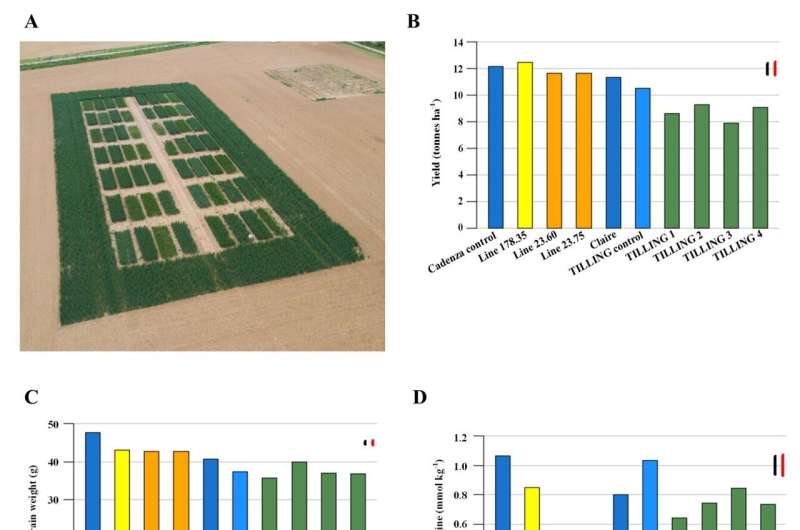February 15, 2023 report
This article has been reviewed according to Science X's editorial process and policies. Editors have highlighted the following attributes while ensuring the content's credibility:
fact-checked
peer-reviewed publication
trusted source
proofread
Using CRISPR-Cas9 to knock out asparagine gene in wheat to reduce cancer risk

A team of biologists from Rothamsted Research, the University of Bristol and Curtis Analytics Limited—all in the U.K.—has used the CRISPR-Cas9 gene editing system to knock out the asparagine gene in wheat grown in real-world conditions—part of an effort reduce the risk of cancer in people who consume food made from plants that produce the compound. The team has published an article describing their work in Plant Biotechnology Journal.
Scientists have known for a long time that many types of plants and animals produce an amino acid called asparagine, which by itself is not considered harmful. When it is heated to a certain degree, a chemical reaction occurs that results in the production of acrylamide, a carcinogen. Prior research has shown that it can increase the risk of developing cancers in mice.
Asparagine is produced by cows and winds up in both milk and meat, and also by many types of food fish. It is also produced by many crop plants, such as potatoes and asparagus and by many whole grains, including wheat. Medical scientists have not been able to verify whether baked products such as bread have levels of acrylamide high enough to pose a health risk but would like to see levels of asparagine in flour reduced to ensure safety.
Prior research has shown that the amount of asparagine in plants varies depending on weather conditions as they grow. In this new effort, the team in the U.K. sought to reduce the amount produced in wheat plants independent of weather conditions.
Back in 2021, the same research team used CRISPR-Cas9 to remove the gene responsible for the generation of the amino acid in wheat plants to reduce the amount of acrylamide created during baking. They tested their work by growing wheat samples in a greenhouse and measuring asparagine levels after the plants grew to full maturity.
This reduced the amount of the asparagine produced by the plants by approximately 50%. In this new effort, the research team used the same gene editing technique to alter wheat plants, but this time around, allowed the plants to grow under normal, real-world farming conditions. Testing showed that such plants also had roughly half the amount of asparagine as unaltered plants. They suggest their technique shows that asparagine levels in a crop plant can be safely reduced by using gene editing techniques.
More information: Sarah Raffan et al, Field assessment of genome edited, low asparagine wheat: Europe's first CRISPR wheat field trial, Plant Biotechnology Journal (2023). DOI: 10.1111/pbi.14026
Journal information: Plant Biotechnology Journal
© 2023 Science X Network




















